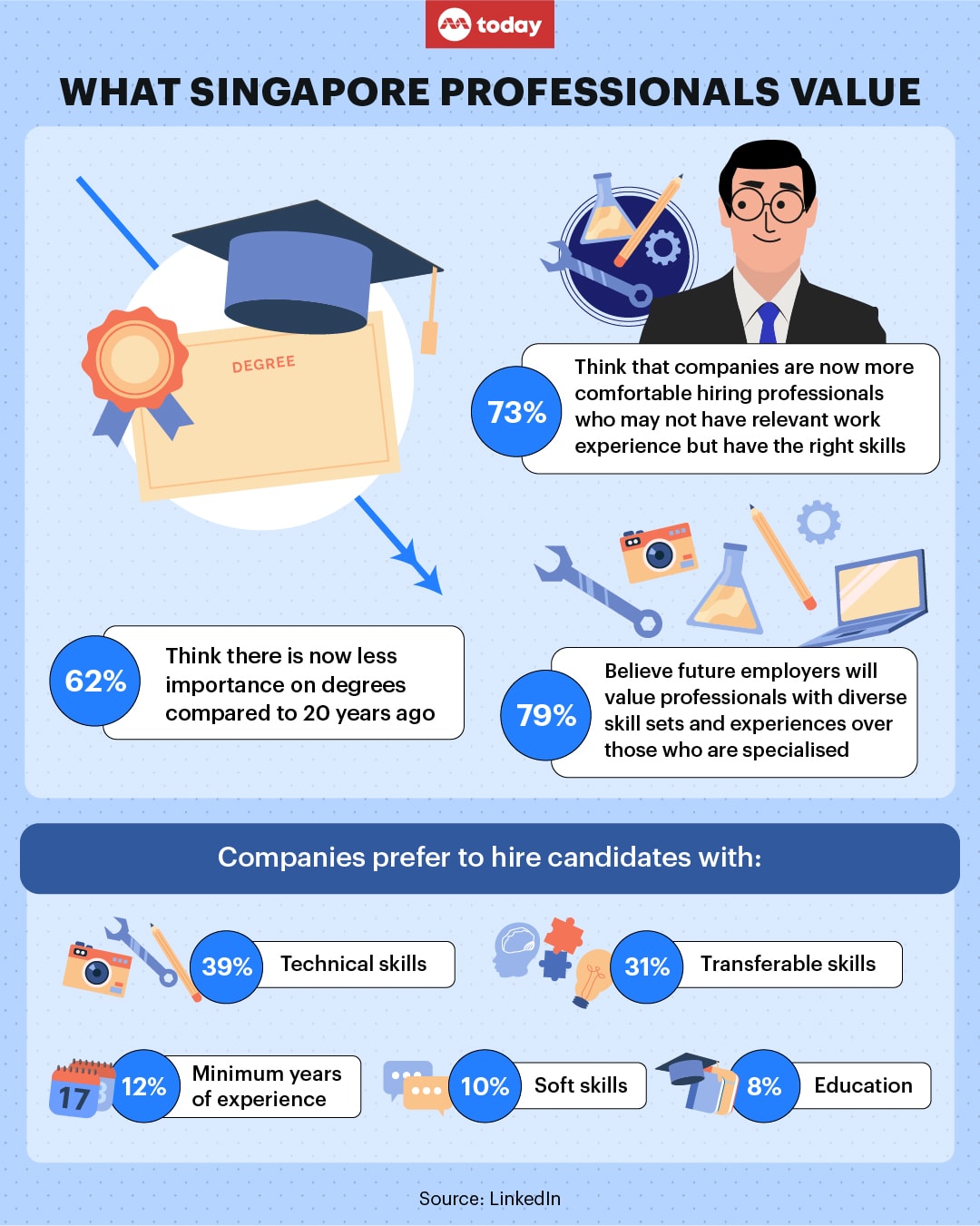Employers and HR experts say academic qualifications shouldn't be totally done away with, as survey shows changing attitudes
SINGAPORE — Twenty years from now, Ms Tan, 25, wants to be able to look back on her career and see that she has picked up multiple practical and soft skills while performing various interesting roles, not necessarily within the same industry.

- More than six in 10 professionals in Singapore believe a degree is less important in landing a job today than 20 years ago, a study by LinkedIn found
- Instead, active networking, continual upskilling, and possessing diverse skill sets and experiences are increasingly important in the job market, for example
- Some 73 per cent of those surveyed think that companies are now more comfortable hiring people who may not have the relevant experience but possess the right skills
- Young people, employers and human resource professionals said they have seen a shift towards a skills-first approach
- However, this does not mean that academic qualifications should be done away with completely
SINGAPORE — Twenty years from now, Ms Tan, 25, wants to be able to look back on her career and see that she has picked up multiple practical and soft skills while performing various interesting roles, not necessarily within the same industry.
“I don't want to look back 20 years later only to find out that I've only learned five new things, you know. Opportunity for growth is a question I always ask during the interview,” she added. Ms Tan did not want to reveal her full name because she is in between jobs and did not want to jeopardise her chances of being hired.
Her sentiments echo the key findings of a LinkedIn survey published in a media release on Tuesday (May 16), which found that more than six in 10 (62 per cent) professionals in Singapore believe that a degree is less important in landing a job today compared with 20 years ago.
Instead, things such as active networking, continual upskilling, and possessing diverse skill sets and experiences are increasingly important in the job market.
The survey also found that 73 per cent of Singapore professionals surveyed think that companies are now more comfortable with hiring professionals who may not have relevant work experience, but are equipped with the right skills.
Young people, employers and human resource professionals told TODAY that they have seen a shift towards a skills-first approach, but this does not mean that academic qualifications should be done away with completely.
WHY IT MATTERS
Singapore has been debating the issue of meritocracy in recent years, with government ministers reiterating that they want the society to be one that enables multiple pathways to success.
Speaking in Parliament last month, President Halimah Yacob said that the Government needed to rethink its approach to education and work, including according greater value to those who are skilled in technical and practical abilities.
In such a society, one’s skills and experience should not be perceived as any less valuable than one’s academic qualifications, and the wage gap between white- and blue-collar workers should not be as wide as it is today.
Mr Frank Koo, head of Asia, talent and learning solutions at LinkedIn, said: “There is no longer one single formula for career success and more people are actively pursuing purposeful careers on their own terms."
To study how Singapore professionals’ attitudes towards work have changed over the years, LinkedIn commissioned Censuswide, a research firm, to conduct research on 1,000 workers based in Singapore and who are aged 18 and above, from April 6 to 12.
TODAY spoke with young professionals, employers and human resource experts on the key findings.
NON-LINEAR CAREER PATHS, CAREER PIVOTS ON THE RISE
More than three-quarters (77 per cent) of Singapore professionals today said that they are more open to career pivots, compared with 20 years ago.
Seven in 10 plan to pivot to a new career, or a role with a different job scope, within the next two to three years, the study found.
Ms Tan, who used to work in the information technology sector, said: “At my current phase of life, I'm still in the midst of figuring myself out. I don't want to set anything in stone, which I think is what a linear career path will end up doing to me.”
A 24-year-old technology strategist, who wanted to be anonymous because she did not want to influence her employers’ perception of her, agreed that a linear career path is less important today since many jobs have transferable skills. She added that she is personally open to exploring other career options and would not limit herself.
To aid their pursuit of non-linear career paths, eight in 10 Singapore professionals agree that transferable skills have become more valued and acceptable among employers here, the survey also found.
Mr Richard Bradshaw, managing director of recruiting firm Ethos BeathChapman (EBC), said: “With tight talent pools, Singapore has had to focus more on transferable skills.
“At EBC, we’ve noticed a sharp increase of our (clients) being more comfortable to progress applications with solely relevant skill sets but missing industry experience, for example.”
Mr Simon Ma, managing director of software company Freshworks, said: “Things like critical thinking, your attention to detail, problem-solving skills, leadership, communication and teamwork — these will be very critical, and these are also transferable skills.”

JOBS THAT ALIGN WITH WORKERS' VALUES
Salary remains important for a job, but a majority of respondents (77 per cent) believe that it is now more important to search for a job or company that aligns with the culture and values they support and believe in, compared with 20 years ago, the study found.
Even during times of economic uncertainty, almost eight in 10 (79 per cent) people surveyed said that they would work for organisations that demonstrate an alignment with their beliefs and values.
Mr Bradshaw from EBC said: “Gen Zers have mindsets and personal values shaped by their environment, upbringing, education and culture. It's not just a cliche to say we witness Gen Zs seeking meaningful work that goes beyond just earning a pay cheque, and prioritising things such as purpose, corporate social responsibility, and authenticity,”
Mr Sukhdeep Singh, director of people at Foodpanda Singapore, agreed: “We’ve observed that interviewees, especially the younger applicants, are asking more questions about the company to assess if company values and culture are aligned with their own values.”
The two young professionals who spoke to TODAY agreed that alignment with a company’s values was important to them.
The 24-year-old tech strategist said that although her priority as a fresh graduate would be her salary and to gain as much experience as possible, a company's values would be a more important factor in time to come.
ACTIVE NETWORKING CRUCIAL FOR CAREER SUCCESS
LinkedIn’s research also found that a large majority (83 per cent) of Singapore professionals believe that a strong network is more important in helping to secure a job today, compared with 20 years ago.
“My friends have connected and formed good relationships with people of similar professions who are working in various companies,” the tech strategist said, adding that they get useful career advice and mentorships from these connections.
Mr Ma from Freshworks said that networking would allow workers to know the market better. They may also speak with employers to understand what they are looking for and what the opportunities and trends in the market are.
Ultimately, it boils down to what individuals do with this information. Knowing the perceived gap between their skills acquired in school and what companies are looking for would allow the candidate to better position themselves, Mr Ma added.
PRIORITISING A SKILLS-FIRST APPROACH
Today, more than seven in 10 (73 per cent) Gen Zers and professionals across all generations are prioritising skills over degrees, the study found.
The majority of Singapore professionals surveyed (79 per cent) also believe that future employers would value diverse skill sets and experiences over candidates who are specialised in a certain job function.
In Singapore, data from a LinkedIn research published in 2021 revealed that more companies preferred to hire candidates with technical skills (39 per cent) and transferable skills (31 per cent), over education (8 per cent) and minimum years of experience (12 per cent).
Mr Alex Tam, the group chief executive officer of dating company Paktor, said: “We put great emphasis on the candidate's past experiences and how it can value-add to our business in the long run. Depending on the role, we do not require all our hires to be degree-holders.
“Nonetheless, a good education background serves as a track record for commitment and the ability to learn new skills and knowledge.”
Mr Bradshaw said: “Skills-based hiring should not be seen as a complete dismissal of formal education but, rather, as a complementary approach that acknowledges the importance of practical skills alongside qualifications.”
Agreeing, the 24-year-old tech strategist said that while having experience was important, she does not think that she would have been provided with her internship and work opportunities to gain these experiences in the first place if she did not have a degree.
Mr Singh from Foodpanda Singapore said: “Of course, there are roles that require technical skills and in such cases, qualifications or formal education in these areas do boost the candidate’s probability to succeed in the hiring process and also in the role itself.”
Ultimately, it is key that the candidate demonstrates the ability to adapt his or her skills based on the changing demands of their industry, Mr Singh said, adding that even past relevant experiences could also quickly become obsolete.











